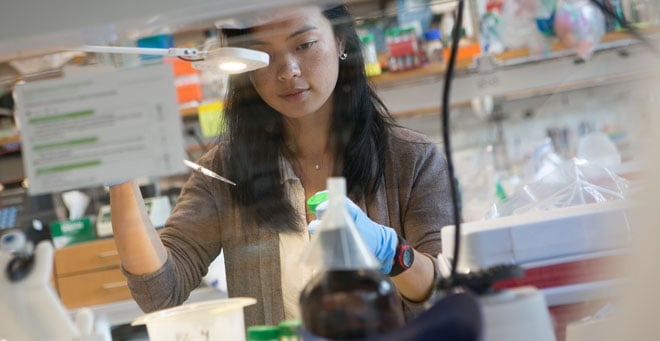 |
|
|
UMass Medical School departments ranked in the top 50 by Blue Ridge include emergency medicine, biochemistry, orthopedics, pathologyy, radiology, medicine (including internal medicine), neurology, psychiatry, pediatrics and family medicine. |
UMass Medical School ranked 29th out of 139 U.S. medical schools in National Institutes of Health funding, according to the 2016 report from the Blue Ridge Institute for Medical Research. Ten academic departments at UMMS ranked in the top 50 among their peers at similarly named departments at U.S. medical schools in this important metric of research competitiveness.
UMass Medical School departments ranked in the top 50 by Blue Ridge include emergency medicine at 5; biochemistry at 10; orthopedics at 22; pathology at 29; radiology at 30; medicine (including internal medicine) at 34; neurology at 34; psychiatry at 35; pediatrics at 40; and family medicine at 41. Several basic science departments, including the Program in Molecular Medicine; the RNA Therapeutics Institute; molecular, cell & cancer biology; and neurobiology are not included in Blue Ridge department rankings because their department names do not match with NIH categories.
Overall research funding from all sources at UMMS is $288 million.
“The broad research competitiveness of UMass Medical School academic departments across both clinical and basic sciences is a tremendous tribute to the hard work and expertise of our faculty across the entire institution,” said Terence R. Flotte, MD, the Celia and Isaac Haidak Professor of Medical Education, executive deputy chancellor, provost, dean of the School of Medicine and professor of pediatrics. “Our faculty, chairs and research leadership in the Office of Research and the Center for Clinical and Translational Sciences should all be proud of this accomplishment. It bodes very well for the future of our research mission going forward.”
UMMS received more than $143 million in NIH funding between Oct. 1, 2015, and Sept. 30, 2016, placing it among the top public medical schools in the Northeast, according to the Blue Ridge Institute report.
“The biomedical research enterprise at UMass Medical School fuels significant scientific discoveries in our labs that translate into improved patient outcomes, as well as tremendous economic growth for our region and Massachusetts as a whole,” said Chancellor Michael F. Collins. “Every dollar of funds we secure from the NIH spurs $2.30 of economic development.”
According to the Blue Ridge report, NIH funding increased by more than $19 million at UMMS over the last year.
A nonprofit medical research institute, Blue Ridge explores the interfaces of fundamental biological science, clinical science and clinical care with a special emphasis on targeted cancer therapy. Each year the institute tabulates and ranks, by medical school department, NIH awards obtained from the publicly available Research Portfolio Online Reporting Tool (RePORT) from the National Institutes of Health website.
Related story on UMassMedNow:
UMMS ranks highly among NIH-funded medical schools